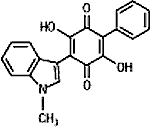NEWS FLASH!
SAY FAREWELL TO DAILY INJECTIONS
The latest in research may dramatically change how the medical field approaches diabetic therapy in the near future. The following new treatments are on the horizon, most of which do away with the dreaded daily injections.
 One discovery has made the goal of an oral substitute for insulin a possibility. After screening 50,000 natural and synthetic chemicals, researchers found a nonpeptide chemical in an African fungus that binds with the insulin receptors and brings about the same intracellular responses as insulin does. Because this molecule is not a protein, it can not be destroyed by the digestive enzymes. Thus, this insulin "mimic" could be taken as a pill, eliminating the need for insulin injestions.
One discovery has made the goal of an oral substitute for insulin a possibility. After screening 50,000 natural and synthetic chemicals, researchers found a nonpeptide chemical in an African fungus that binds with the insulin receptors and brings about the same intracellular responses as insulin does. Because this molecule is not a protein, it can not be destroyed by the digestive enzymes. Thus, this insulin "mimic" could be taken as a pill, eliminating the need for insulin injestions.
Some scientists are turning to tissue engineering in hope of developing laboratory-grown, insulin-secreting cell lines that could serve as surrogates for pancreatic Beta cells.
Other scientists are working toward development of an implanted, glucose-detecting, insulin-releasing artificial pancreas that would continuously monitor the patient's blood glucose level and deliver insulin in response to need.
On yet another front, scientists are hopeful of one day developing immunotherapies that specifically block the attack of the immune system against the Beta cells, thus preventing Type I diabetes.
FREE OFFER
"Diabetic Meals in 30 Minutes or Less", by Robyn Webb is available free of charge. The cookbook includes more than 140 recipes as well as information about links between type 2 diabetes and heart disease. The cook book can be obtained by calling (800) 307-7113 or by visiting 
Is Water Clearly the Answer?
Research published in a 2002 issue of "Diabetic Care" found a correlation between children with type 1 diabetes and the pH of their drinking water. Children who regularly drank water with a pH between 6.2 and 6.9 were nearly 4 times more likely to be diagnosed with type 1 diabetes. The author believes that the water is probably not the direct cause, but possibly the low pH provides an environment suitable for bacterial or viral growth, which in turn could trigger diabetes. The only conclusion that is possible at this time is, more research is needed in this area.